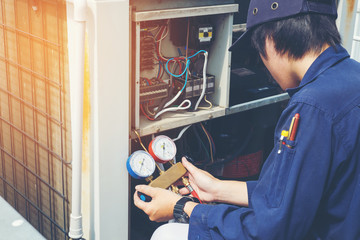If you are looking for ways to save on your home’s Heating and Cooling expenses, you have come to the right place. Heating and air conditioning systems are an excellent option for many buildings. HVAC systems use various technologies to help regulate temperature, humidity, and air purity. The result is comfortable thermal comfort and acceptable indoor air quality. Here are some tips for selecting the right HVAC system for your home. Below are some of the most common methods of controlling temperature and humidity.
 Proper HVAC system maintenance is essential to ensure it operates at peak efficiency. Cleaning air filters and keeping outdoor units clear of debris are easy, do-it-yourself maintenance tasks that will benefit your home’s heating and cooling system. Heating and Cooling will check your HVAC equipment once a year as another way to keep it running smoothly. And remember, proper maintenance can lower your utility bills and protect the environment. You’ll be happy you did!
Proper HVAC system maintenance is essential to ensure it operates at peak efficiency. Cleaning air filters and keeping outdoor units clear of debris are easy, do-it-yourself maintenance tasks that will benefit your home’s heating and cooling system. Heating and Cooling will check your HVAC equipment once a year as another way to keep it running smoothly. And remember, proper maintenance can lower your utility bills and protect the environment. You’ll be happy you did!
Freezing and cooling both cause changes in matter. During the freezing process, a cup of outside water can turn into ice. Another example of cooling is food stored in the freezer. Cooling food keeps it cold and is a useful way to keep it cool. While the freezing process causes a reversible change in matter, cooling is not as permanent. After melting butter, it will turn back into a solid.
Energy efficiency also depends on the region you live in. Warm-weather climates are typically warmer than colder ones, and the need for heating and cooling is different in these regions. These factors can change the installation cost by as much as 20 percent. Furthermore, larger homes often require larger systems. The cost of multiple systems is also higher than for a single system. Also, the type of window seals and the quality of insulation in a home can affect energy efficiency.
To estimate the total square footage of your home, you can look at a blueprint or measure it room by room. Next, multiply the length and width of each room by its height. Finally, subtract the length and width of rooms that won’t be heated. In addition, remember to take into account the height of each room to determine the exact square footage. Taller rooms will require more BTUs to heat. If you’re concerned about comfort and energy efficiency, consider consulting an HVAC contractor.
The different types of Heating and Cooling systems have different functions. They generate heat by utilizing various technologies to heat or cool air inside the building. Heating systems can be central or space-based and use water, steam, or air to transfer heat. HVAC systems also use conduction and radiation to transfer heat. Ultimately, they provide thermal comfort and acceptable indoor air quality. A space heater can be a great choice if you’re not a big fan of central heating.
The temperature of the ground is about 1.8 meters below the surface and varies according to latitude. Its boiling point ranges from seven to twenty-four degrees Celsius to 75 degrees Fahrenheit. This makes it an ideal choice for homes with extra space. Getting a free HVAC estimate online is another way to find the right HVAC for your home. There are many free online estimates to compare prices. You can even save money by installing a geothermal heating and cooling system.
Despite their names, HVAC stands for Heating, Ventilation, and Air Conditioning. HVAC systems exchange indoor air with outside air for healthy indoor air. Air conditioning uses outside air to cool the indoor air and remove humidity. While both types of HVAC systems can work together, they’re often best used in conjunction with each other to provide optimum comfort. Fans can be a fantastic alternative to conventional heating and cooling systems. Ceiling and floor fans will circulate air throughout the immediate area.
Another type of Heating and Cooling system is the radiant system. This heating and cooling system channels hot water through pipes buried in the walls and into rooms. Radiant systems can channel heated air directly from the unit or through registers. Some of these systems run on electricity and gas. Unlike radiant systems, forced-air systems cannot distribute cool air from an air conditioner. A radiant heating system also uses heat from an electrical heater. They are popular in homes with concrete slab foundations.
